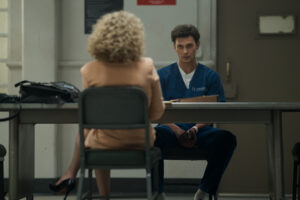In a case like the one involving Erik and Lyle Menendez, it’s easy to get lost in the fray. With the introduction of a televised courtroom, every viewer could formulate their self-proclaimed “expert” opinion, and the tabloids could run any story they saw fit. Holding onto our humanity almost seems impossible, but one woman involved in this case allows us to see these brothers in a whole new light. I remember seeing Leslie Abramson on television giving interviews about the case, but I don’t think I ever saw her until I tuned into Netflix’s Monsters: The Erik and Lyle Menendez Story. In a unapologetically fierce turn, Ari Graynor shows how the love of a parent should always guide a child–even if they aren’t your own.
In her first scene, Abramson is being interviewed at a posh restaurant over brunch. She is so charming and charismatic, her cigarette punctuating sentences as other guest chatter around her. When the interviewer asks her if “outrage is her middle name,” her gaze is turned downward before she meets our eyes and says, ‘Actually, it’s hope.’ Would some people take her more seriously if that outrage was officially synonymous with her name? Graynor insists that that name suits Abramson’s point of view more than people think.
“What I think is so wonderful about that is, of course, everyone sees her as outraged, which she can be,” Graynor says. “But I love that she has this secret name of Hope, both in her own name and in her work. In my research about her, I found out that she grew up in Queens and her grandmother was a labor organizer. The first memory that Leslie had was seeing photos from the Holocaust about her family, and she said so much of her home life was dedicated to talking about fairness and empowerment over institutions and not having the government take advantage of people. I think her superpower is that her heart is led by this kind of hope for fairness. That was evident to me right when I first saw her–this edge was ferocious and sharp.”
When Abramson is brought onto the case, the Menendez family already has doubts about the people who can represent the boys. She represents Erik while Jess Weixler’s Jill Lansing backs Lyle, but diving into a case this huge–with immediate media scrutiny–could be intimidating for anyone. Graynor is reflective about Abramson’s fears going into this moment.

“I’m not sure if I have a full answer to that, honestly,” she says thoughtfully. “Leslie likes the challenge, and she likes that it’s hard. I don’t know that anyone could have predicted, at the time, what this case would become. You know, I think she knew it was a big case, and I think she was excited to be on board to have that challenge and be in the center of that. Not only did no one anticipate the size of this case, but who could have predicted that 35 years later, we would still be talking about it?
This story gets to us on an almost archetypal level where it confronts some of our biggest fears like patricide and horrible sexual abuse at the hands of a parent. Those are two of the most intense realities and fears that exist. It makes sense that it ignites that in us, and I think that Ryan [Murphy] and the writers of the show look at it from so many different points of view. It’s meant to incite all of these questions to have the audience asking themselves how [they] feel.”
In episode five, “The Hurt Man,” the camera never loses focus on Cooper Koch’s face. The camera pans in so slowly that it might take us a few moments to realize that we are quietly stepping towards this emotional confession with Graynor’s back to us as she listens to Erik’s account. The spark between Graynor and Koch is never lost, and even though we never see her face, we can feel her empathy. It’s no wonder that audiences and critics are heralding it as one of the best episodes of televiion of the year.
“There were so many things that were extraordinary about that episode, but that script was written almost a year before we shot it and nothing changed,” Graynor reveals. “That shot was written into the script as well and as soon as I read the script, I knew that that was the intention of it. I thought that they might get some safety coverage, but they stuck with the initial concept. For me, it never mattered where the camera was, and that was such a gift for both Cooper and myself. Certainly as actors, and human beings, it recognized that we can talk about these things and we can hold space for the unspeakable of the unspeakables. That was deeply important to us. We always felt like it was a play and it was a conversation. I had done so much work on Leslie and Leslie’s love for Erik, and we talk a lot about episode five being the time where Leslie sort of becomes Erik’s mother. In an overarching sense, that was kind of a north star.
That episode was a totally holistic acting experience of just saying that it doesn’t matter where the camera is. What Cooper had to do was so difficult and what he did every time was extraordinary and special and important. I wanted to give Cooper everything that I could give.”

Abramson loses the first case, but she stays on to back Erik again. This time she represents both brothers, and they have to start from scratch. After she holds a meeting with some of the female jurors from the first trial, Abramson is confident, but she has no idea how the prosecution will railroad her. In one scene, Erik tells her, ‘How are you going to fix this? You can’t,’ and we almost see her face fall. There is a lot in Monsters about Abramson’s maternal care for Erik, but there is also something about how a child gives up believing in the person sworn to protect them.
“I think she can handle hearing that people don’t like you, but the worst thing she could hear is that she didn’t do a good job,” she says. “And that she can’t fix something. Having no control or not having done all that she could save them, I think was just unbearable for her. I think she was devastated when Erik tells her that she can’t fix it.
There was something that she wrote in her book that she talks about when she was in therapy and she said something about how it took her a long time to understand how other people saw her. It wasn’t how she felt inside, and that was one of those incredible, small sentences that had such huge feeling that I totally understood. Some people might call her aggressive, but I think she is just passionate. I feel that way sometimes. When I get excited about something, I don’t realize how loud or big I am getting–I get on a roll. Sometimes when you’re just inside a feeling in yourself, you don’t realize how you necessarily come across. Let that passion be free.”
Monsters: The Erik and Lyle Menendez Story is streaming now on Netflix.









